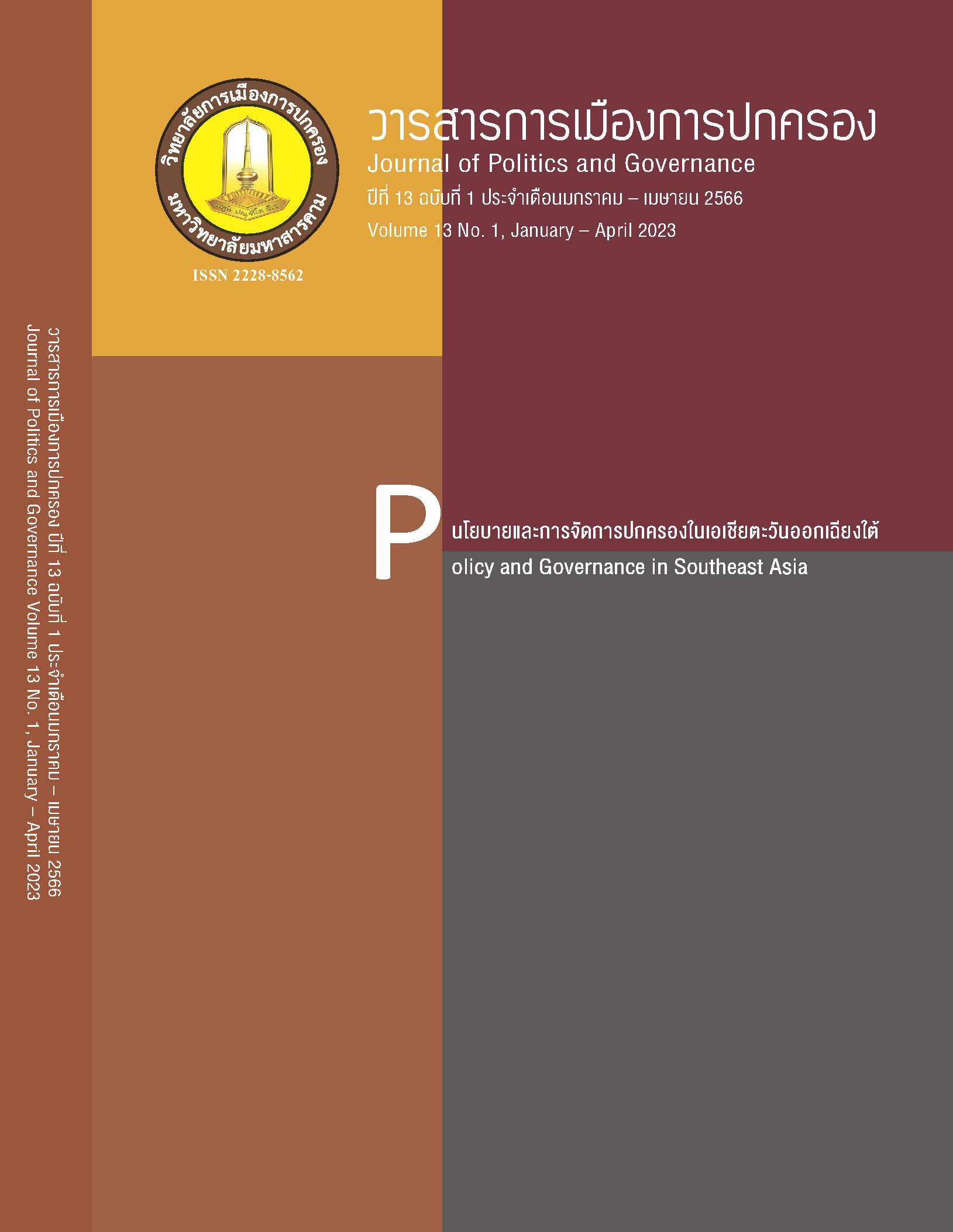J. League’s Asian Strategy: Football Cooperation as a New Feature in Thai-Japanese Relations
Main Article Content
Abstract
In 2012, Japan launched J. League's Asian Strategy as a kind of sports diplomacy to strengthen collaboration among Asian partners and to boost own economy benefits while competing with regional major powers. In this moment, the article has two research objectives for understanding the shape of Thai-Japanese football cooperation. Firstly, key actors in Thailand who have been engaging in football activities promoting their relationship. Lastly, the activities that manifest the football cooperation as a new facet of Thai-Japanese relations. Research methodology is qualitative research with documentation from both primary and secondary sources, which procedurally includes search and collect, content analysis, and discussion though the concept of sports diplomacy. This study argues that football association, football clubs, and footballers are the key actors who play a vital part in driving the above-mentioned strategy. The Football Association of Thailand collaborates with the Japan’s counterpart to initiate their comprehensive football cooperation, particularly on the enhancement of the skills of Thailand's football national teams for both men and women by Japanese professional coaches. Furthermore, 11 football club partnerships have been formed since the beginning that mainly focus on sharing management knowledge and youth exchanges. Thai footballers in the J. League also contribute to increase awareness of Japanese football and spread other parts of Japanese stories across Thai society. Many of the activities listed above have a constructive effect on the bilateral relations. With these mentions, the football cooperation is now a new feature in Thai-Japanese relations.
Article Details
References
กระทรวงพาณิชย์. (2563). ลำดับความสำคัญประเทศคู่ค้าของไทยปี 2562. สืบค้นจาก http://www2.ops3.moc.go.th/
เดลินิวส์. (2555). "ไทยลีก" ลงนามกับ "เจลีก" ร่วมมือกัน 10 เรื่องสำคัญ. สืบค้นจาก https://www.dailynews.co.th/sports/172839
ไทยรัฐออนไลน์. (2560). ส.บอลไทยลงนาม MOU ร่วมกับเจเอฟเอ. สืบค้นจาก https://www.thairath.co.th/sport/trcheerthai/897925
เอื้อมพร หลินเจริญ. (2555). เทคนิควิเคราะห์ข้อมูลเชิงคุณภาพ. วารสารการวัดผลการศึกษา, 17(1), 17-29.
Abdul-Rahim, A. (2013). An econometric analysis of sport tourism in Thailand. International Journal of Business and Social Science, 4(5), 251-255.
Cha, V. D. (2009). Beyond the Final Score: The Politics of Sport in Asia. New York: Columbia University Press.
Dolles, H., & Söderman, S. (2013). Twenty years of development of the J-League: Analysing the business parameters of professional football in Japan. Soccer & Society, 14(5), 702-721.
FAThailand. (2562). สมาคมฯ จับมือเจแปนฟาวน์เดชั่นจัดแมตซ์พิเศษช้างศึก U16 พบ Asian Eleven U16. สืบค้นจาก http://fathailand.org/news/4782
Houlihan, B. (1994). Sport and International Politics. New York: Harvester Wheatsheaf.
Huebner, S. (2016). Pan-Asian Sports and the Emergence of Modern Asia, 1913-1974. Singapore: NUS Press.
J.League. (2020). From the J.League into Asia, from the Asia to the world. Retrieved from https://www.jleague.jp/en/aboutJ/
Jarvie, G. (2003). Internationalism and sport in the making of nations. Identities, 10(4), 537-551.
Karnjanakit, S., & Samahito, S. (2005). Thailand and the Asian Games: Coping with crisis. Sport in Society, 8(3), 440-448.
Kobierecki, M. M. (2013). Sport in international relations expectation, possibilities and effects. International Studies. Interdisciplinary Political and Cultural Journal, 15(1), 49-74.
Main Stand (2563), ญี่ปุ่นเปลี่ยนทีมองค์กรเป็นสโมสรอาชีพได้อย่างไร? สืบค้นจาก https://www.mainstand.co.th/1167
Manzenreiter, W. (2004). Japanese football and world sports: Raising the global game in a local setting. Japan Forum, 16(2), 289-313.
Manzenreiter, W. (2008). Football diplomacy, post-colonialism and Japan's quest for normal state status. Sport in Society, 11(4), 414-428.
Manzenreiter, W. (2014). Sport and Body Politics in Japan. Oxfordshire: Routledge.
Murphy, P. (2017). Thailand sign MOU with Japan, want to learn from Samurai Blue success. Retrieved from ESPN https://www.espn.co.uk/football/blog-football-asia/story/3090643/thailand-sign-mou-with-japanwant-to-learn-from-samurai-blue-success
Nikkei Asian Review. (2020). Big in Thailand: Japan soccer catches on in Southeast Asia. Retrieved from https://asia.nikkei.com/Business/Business-trends/Big-in-Thailand-Japan-soccer-catches-on-in-Southeast-Asia
Sakaedani, A. (2005). 2002 FIFA World Cup and its effects on the reconciliation between Japan and the Republic of Korea. Japanese Journal of Political Science, 6(2), 233-257.
Thai League. (2563). Clubs. สืบค้นจาก https://www.thaileague.co.th/#b1
Thailand Board of Investment. (2563). รายงานและสถิติการลงทุนจากต่างประเทศ ปี 2562. สืบค้นจาก https://www.boi.go.th/index.php?page=statistics_oversea_report_st&language=th
The Japan Times. (2019). Thai star drives J. League's popularity abroad. Retrieved from https://www.japantimes.co.jp/sports/2019/09/18/soccer/thai-star-drives-j-leagues-popularity-abroad/#.Xj0ZGWgzb4a
Yoshifumi, B., & Shintaro, S. (2017). Marketing football: Perspectives from the Japan football League (J. League). In N. Chanavat, M. Desbordes, & N. Lorgnier (eds.), Routledge Handbook of Football Marketing (pp. 420-428). Oxfordshire: Routledge.


